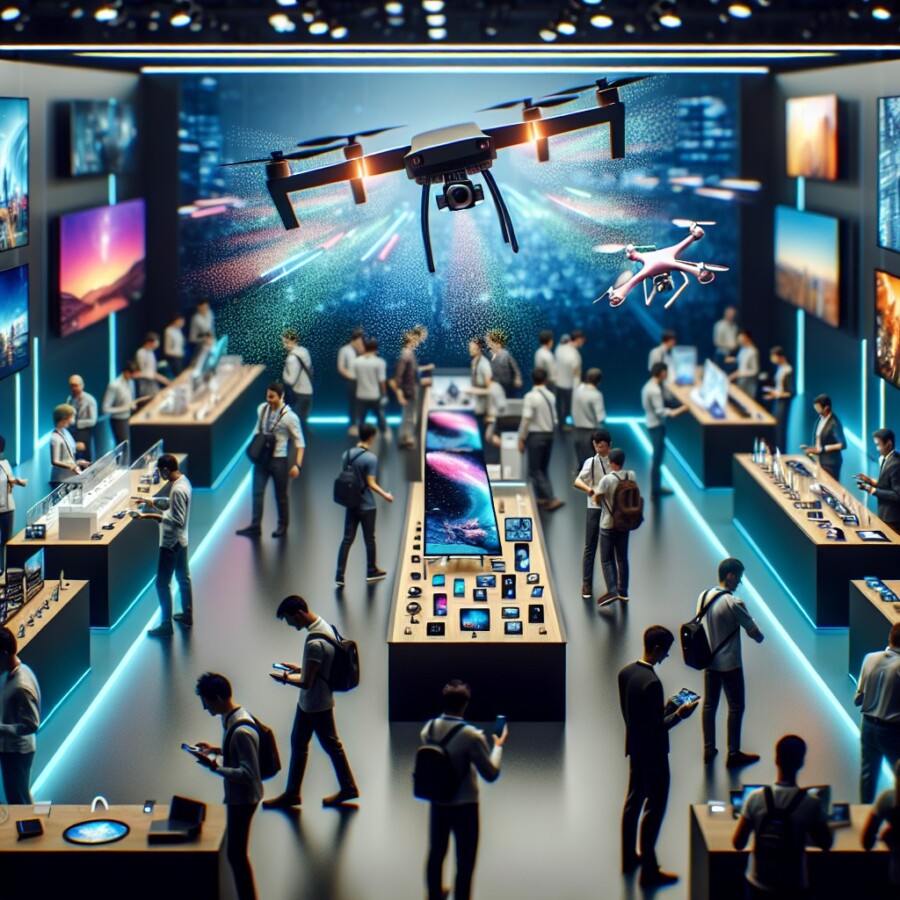The Consumer Electronics Show (CES) is a big event where tech companies show off their newest gadgets. Some of these gadgets say they have artificial intelligence (AI). For example, there’s a pillow that can tell if you’re snoring and adjusts to help you stop. Samsung also has some AI devices, like a vacuum cleaner and a washing machine that can figure out what kind of surface or fabric it’s dealing with. But the problem is, the definition of AI is kind of fuzzy, and some companies are using the term to get attention and money. This has made people worried about false claims and misleading ads.
The main issue with AI is that there isn’t one clear definition that everyone agrees on. This has led to a lot of hype and companies exaggerating what their AI can do. The Federal Trade Commission (FTC) in the US has told companies to be careful about making false claims, but even they admit that AI is a tricky term with lots of different meanings. As a journalist, it’s hard to know if these claims are true when companies don’t give much evidence.
Some companies are starting to avoid using the term AI and instead talk about specific AI techniques or models. For example, Rabbit’s R1 device uses something called generative AI, but they don’t make a big deal about it in their ads. Samsung’s fridge that can analyze food and suggest recipes is a good example of AI in action. But do people really need their fridge to tell them what to cook?
In the end, there are a lot of products at CES claiming to have AI, but the definition of AI is still unclear. Companies might be stretching the truth to get attention. This makes it hard for consumers and journalists to know if these claims are real. Some companies are already moving away from using the term AI and focusing on specific AI techniques instead. It’s up to consumers to decide if they really need AI gadgets or if regular ones are good enough.
Original news source: CES 2024: AI pillows and toothbrushes – is it all getting a bit silly? (BBC)
🎧 Listen:
Slow
Normal
Fast
📖 Vocabulary:
| 1 | gadgets | Small electronic devices or tools with a practical use |
| 2 | artificial | Made by humans, not natural |
| 3 | adjusts | Changes or modifies to fit a need or situation |
| 4 | fabric | Material made by weaving, used to make clothes and other things |
| 5 | fuzzy | Not clear or definite; vague |
| 6 | misleading | Giving the wrong idea or impression |
| 7 | hype | A lot of excitement and talk about something, sometimes more than is deserved |
| 8 | exaggerating | Making something seem more important or larger than it really is |
| 9 | evidence | Information that shows whether something is true or valid |
| 10 | techniques | Methods or ways of doing things |
| 11 | generative | Able to create or produce new things, often using technology |
| 12 | analyze | To examine or study something carefully |
| 13 | recipes | Instructions for preparing food |
| 14 | stretching | Making something seem longer or more important than it is |
| 15 | consumers | People who buy products or use services |
Group or Classroom Activities
Warm-up Activities:
– Headline Creation
Instructions: In pairs or small groups, students will create attention-grabbing headlines for articles about AI gadgets at the Consumer Electronics Show (CES). They should try to use catchy or intriguing language to draw readers in.
– Opinion Spectrum
Instructions: Create a spectrum on the board with “Strongly Agree” on one end and “Strongly Disagree” on the other. Give each student a sticky note and have them write their opinion on whether AI gadgets are necessary or if regular ones are good enough. Then, have them place their sticky note on the spectrum according to their opinion. Allow students to share their reasoning and discuss their placement on the spectrum.
– Synonym Challenge
Instructions: Give each student a piece of paper with a word related to the article written on it (e.g. “exaggerating,” “misleading,” “claim,” etc.). In pairs or small groups, students should take turns giving synonyms or related words for their assigned word. Encourage them to use a variety of vocabulary and discuss the meanings of the words.
– Future Predictions
Instructions: In pairs or small groups, students will take turns making predictions about the future of AI gadgets. They should consider both positive and negative impacts, as well as potential advancements or challenges. After discussing their predictions, they can share their ideas with the class.
– Pass the Story
Instructions: Begin a story related to AI gadgets at CES (e.g. “Once upon a time at CES, a company unveiled a revolutionary AI device…”). Have one student start the story and then pass it on to the next student who adds a sentence. Continue passing the story around the class until everyone has contributed. Encourage creativity and imagination in the story, incorporating elements of AI gadgets.
🤔 Comprehension Questions:
1. What is the Consumer Electronics Show (CES) and what do companies do there?
2. Can you give an example of a gadget with artificial intelligence (AI) that was showcased at CES?
3. Why are people worried about false claims and misleading ads related to AI?
4. Why is it difficult for journalists to determine if companies’ claims about AI are true?
5. How are some companies trying to avoid using the term AI in their advertisements?
6. Can you give an example of a specific AI technique or model that a company is using?
7. What is an example of AI in action that was mentioned in the article?
8. Who ultimately decides if consumers really need AI gadgets or if regular ones are good enough?
Go to answers ⇩
🎧✍️ Listen and Fill in the Gaps:
The Consumer Electronics Show (CES) is a big event where tech companies show off their newest gadgets. Some of these gadgets say they have artificial intelligence (AI). For example, there’s a pillow that can tell if you’re (1)______ and (2)______ to help you stop. (3)______ also has some AI devices, like a vacuum cleaner and a washing machine that can figure out what kind of surface or (4)______ it’s dealing with. But the problem is, the definition of AI is kind of fuzzy, and some companies are using the term to get attention and money. This has made people worried about false claims and misleading ads.
The main (5)______ with AI is that there isn’t one clear definition that everyone agrees on. This has led to a lot of hype and companies (6)______ what their AI can do. The Federal Trade Commission (FTC) in the US has told companies to be (7)______ about (8)______ false claims, but even they admit that AI is a tricky term with lots of different meanings. As a journalist, it’s hard to know if these claims are true when (9)______ don’t give much evidence.
Some companies are starting to (10)______ using the term AI and instead talk about specific AI techniques or models. For example, Rabbit’s R1 device uses something (11)______ generative AI, but they don’t make a big deal about it in their ads. Samsung’s (12)______ that can analyze food and suggest recipes is a good example of AI in action. But do people really need their fridge to tell them what to cook?
In the end, there are a lot of products at CES claiming to have AI, but the (13)______ of AI is still unclear. Companies might be (14)______ the truth to get attention. This makes it hard for consumers and journalists to know if these claims are real. Some companies are already moving away from (15)______ the term AI and focusing on specific AI techniques instead. It’s up to consumers to decide if they really need AI (16)______ or if regular ones are good enough.
Go to answers ⇩
💬 Discussion Questions:
Students can ask a partner these questions, or discuss them as a group.
1. What is artificial intelligence (AI) and why do you think it’s important in technology?
2. How would you feel if you bought a gadget that claimed to have AI but it didn’t actually perform the tasks it promised?
3. Do you think it’s fair for companies to use the term AI to get attention and money, even if their products don’t truly have AI capabilities? Why or why not?
4. What do you think about the Federal Trade Commission’s warning to companies about making false claims regarding AI? Do you think it’s necessary?
5. How do you think journalists can verify the truthfulness of companies’ claims about AI when there is limited evidence?
6. What are some specific AI techniques or models that companies could use instead of using the term AI in their advertisements?
7. Do you think it’s useful for a fridge to analyze food and suggest recipes? Why or why not?
8. How do you think consumers can determine if they really need AI gadgets or if regular ones are good enough?
9. Have you ever used a gadget or appliance that claimed to have AI? If so, did it meet your expectations? Why or why not?
10. What are some potential advantages of having AI devices in our homes? Can you think of any disadvantages?
11. Do you think it’s important for companies to have a clear and agreed-upon definition of AI? Why or why not?
12. How do you think companies can avoid misleading consumers with false claims about AI?
13. Have you ever been influenced to buy a product because it claimed to have AI capabilities? How did you feel about your purchase afterwards?
14. What do you think the future holds for AI in consumer electronics? Do you think it will become more common or less common? Why?
15. If you were in charge of regulating the use of the term AI in advertisements, what rules or guidelines would you put in place?
Individual Activities
📖💭 Vocabulary Meanings:
Match each word to its meaning.
Words:
1. gadgets
2. artificial
3. adjusts
4. fabric
5. fuzzy
6. misleading
7. hype
8. exaggerating
9. evidence
10. techniques
11. generative
12. analyze
13. recipes
14. stretching
15. consumers
Meanings:
(A) Making something seem longer or more important than it is
(B) Methods or ways of doing things
(C) Material made by weaving, used to make clothes and other things
(D) Changes or modifies to fit a need or situation
(E) People who buy products or use services
(F) Able to create or produce new things, often using technology
(G) To examine or study something carefully
(H) Information that shows whether something is true or valid
(I) Instructions for preparing food
(J) Giving the wrong idea or impression
(K) Made by humans, not natural
(L) Small electronic devices or tools with a practical use
(M) Not clear or definite; vague
(N) A lot of excitement and talk about something, sometimes more than is deserved
(O) Making something seem more important or larger than it really is
Go to answers ⇩
🔡 Multiple Choice Questions:
1. What is the main concern regarding AI gadgets at the Consumer Electronics Show (CES)?
(a) Lack of evidence
(b) False claims and misleading ads
(c) Unclear definition of AI
(d) Companies exaggerating what their AI can do
2. Why is it difficult for journalists to determine the truth behind AI claims?
(a) The Federal Trade Commission doesn’t regulate AI claims
(b) AI techniques are too complex to understand
(c) Companies don’t provide much evidence
(d) Journalists are not interested in AI gadgets
3. What approach are some companies taking to avoid the confusion surrounding AI?
(a) Using the term AI more frequently
(b) Focusing on specific AI techniques or models
(c) Making false claims to attract attention
(d) Ignoring the issue and continuing to use the term AI
4. Which of the following is an example of AI in action?
(a) Rabbit’s R1 device that uses generative AI
(b) A pillow that adjusts to help stop snoring
(c) Samsung’s vacuum cleaner that can figure out different surfaces
(d) Samsung’s fridge that suggests recipes based on analyzed food
5. What is the main issue with the definition of AI?
(a) AI techniques are constantly changing
(b) AI is too complex for consumers to understand
(c) AI is not a relevant term in the tech industry
(d) There is no clear definition that everyone agrees on
6. What has the Federal Trade Commission advised companies regarding AI claims?
(a) To be cautious about making false claims
(b) To exaggerate what their AI can do
(c) To avoid using the term AI altogether
(d) To focus on specific AI techniques in their ads
7. Why are some people concerned about companies using the term AI?
(a) They believe AI gadgets are unnecessary
(b) They think companies are wasting money on AI research
(c) They worry about false claims and misleading ads
(d) They are confused about the definition of AI
8. What is the role of consumers in determining the value of AI gadgets?
(a) To demand clearer definitions of AI from companies
(b) To invest in AI companies to support their research
(c) To decide if they really need AI gadgets or if regular ones are sufficient
(d) To rely on journalists to determine the truth behind AI claims
Go to answers ⇩
🕵️ True or False Questions:
1. Consumers and journalists find it difficult to determine if claims about AI are genuine, as companies often provide limited evidence.
2. The Consumer Electronics Show (CES) is a big event where tech companies showcase their latest gadgets.
3. Some of these gadgets claim to have artificial intelligence (AI), like a pillow that can detect snoring and adjust accordingly.
4. The Federal Trade Commission (FTC) has warned companies about making true claims regarding AI, but even they admit that AI is a simple term.
5. Some companies are now using the term AI and avoiding specific AI techniques or models.
6. Samsung has AI devices, such as a vacuum cleaner and a washing machine that cannot identify different surfaces or fabrics.
7. The definition of AI is not clear and can vary, leading to companies exaggerating what their AI can do.
8. Samsung’s fridge, which cannot analyze food and suggest recipes, is an example of AI inaction.
Go to answers ⇩
📝 Write a Summary:
Write a summary of this news article in two sentences.
Check your writing now with the best free AI for English writing!
Writing Questions:
Answer the following questions. Write as much as you can for each answer.
Check your answers with our free English writing assistant!
1. What is the Consumer Electronics Show (CES) and what is its purpose?
2. What is artificial intelligence (AI) and why are people worried about false claims and misleading ads?
3. Why is it difficult for journalists to determine if companies’ claims about their AI products are true?
4. Give an example of a specific AI technique or model that a company is using instead of using the term AI.
5. What is the main challenge for consumers and journalists when it comes to AI products and how can they make informed decisions about whether they really need them?
✅ Answers
🤔✅ Comprehension Question Answers:
1. The Consumer Electronics Show (CES) is a big event where tech companies show off their newest gadgets. They go there to showcase their latest products and technologies to the public.
2. An example of a gadget with artificial intelligence (AI) that was showcased at CES is a pillow that can tell if you’re snoring and adjusts to help you stop.
3. People are worried about false claims and misleading ads related to AI because the definition of AI is unclear and companies may be exaggerating what their AI can do to get attention and money.
4. It is difficult for journalists to determine if companies’ claims about AI are true because companies often don’t provide enough evidence to support their claims.
5. Some companies are trying to avoid using the term AI in their advertisements by talking about specific AI techniques or models instead. They focus on the specific technology they are using rather than using the broad term AI.
6. An example of a specific AI technique or model that a company is using is Rabbit’s R1 device, which uses something called generative AI.
7. An example of AI in action that was mentioned in the article is Samsung’s fridge that can analyze food and suggest recipes.
8. Ultimately, consumers decide if they really need AI gadgets or if regular ones are good enough for them.
Go back to questions ⇧
🎧✍️✅ Listen and Fill in the Gaps Answers:
(1) snoring
(2) adjusts
(3) Samsung
(4) fabric
(5) issue
(6) exaggerating
(7) careful
(8) making
(9) companies
(10) avoid
(11) called
(12) fridge
(13) definition
(14) stretching
(15) using
(16) gadgets
Go back to questions ⇧
📖💭✅ Vocabulary Meanings Answers:
1. gadgets
Answer: (L) Small electronic devices or tools with a practical use
2. artificial
Answer: (K) Made by humans, not natural
3. adjusts
Answer: (D) Changes or modifies to fit a need or situation
4. fabric
Answer: (C) Material made by weaving, used to make clothes and other things
5. fuzzy
Answer: (M) Not clear or definite; vague
6. misleading
Answer: (J) Giving the wrong idea or impression
7. hype
Answer: (N) A lot of excitement and talk about something, sometimes more than is deserved
8. exaggerating
Answer: (O) Making something seem more important or larger than it really is
9. evidence
Answer: (H) Information that shows whether something is true or valid
10. techniques
Answer: (B) Methods or ways of doing things
11. generative
Answer: (F) Able to create or produce new things, often using technology
12. analyze
Answer: (G) To examine or study something carefully
13. recipes
Answer: (I) Instructions for preparing food
14. stretching
Answer: (A) Making something seem longer or more important than it is
15. consumers
Answer: (E) People who buy products or use services
Go back to questions ⇧
🔡✅ Multiple Choice Answers:
1. What is the main concern regarding AI gadgets at the Consumer Electronics Show (CES)?
Answer: (b) False claims and misleading ads
2. Why is it difficult for journalists to determine the truth behind AI claims?
Answer: (c) Companies don’t provide much evidence
3. What approach are some companies taking to avoid the confusion surrounding AI?
Answer: (b) Focusing on specific AI techniques or models
4. Which of the following is an example of AI in action?
Answer: (d) Samsung’s fridge that suggests recipes based on analyzed food
5. What is the main issue with the definition of AI?
Answer: (d) There is no clear definition that everyone agrees on
6. What has the Federal Trade Commission advised companies regarding AI claims?
Answer: (a) To be cautious about making false claims
7. Why are some people concerned about companies using the term AI?
Answer: (a) They believe AI gadgets are unnecessary
8. What is the role of consumers in determining the value of AI gadgets?
Answer: (c) To decide if they really need AI gadgets or if regular ones are sufficient
Go back to questions ⇧
🕵️✅ True or False Answers:
1. Consumers and journalists find it difficult to determine if claims about AI are genuine, as companies often provide limited evidence. (Answer: True)
2. The Consumer Electronics Show (CES) is a big event where tech companies showcase their latest gadgets. (Answer: True)
3. Some of these gadgets claim to have artificial intelligence (AI), like a pillow that can detect snoring and adjust accordingly. (Answer: True)
4. The Federal Trade Commission (FTC) has warned companies about making true claims regarding AI, but even they admit that AI is a simple term. (Answer: False)
5. Some companies are now using the term AI and avoiding specific AI techniques or models. (Answer: False)
6. Samsung has AI devices, such as a vacuum cleaner and a washing machine that cannot identify different surfaces or fabrics. (Answer: False)
7. The definition of AI is not clear and can vary, leading to companies exaggerating what their AI can do. (Answer: True)
8. Samsung’s fridge, which cannot analyze food and suggest recipes, is an example of AI inaction. (Answer: False)
Go back to questions ⇧













